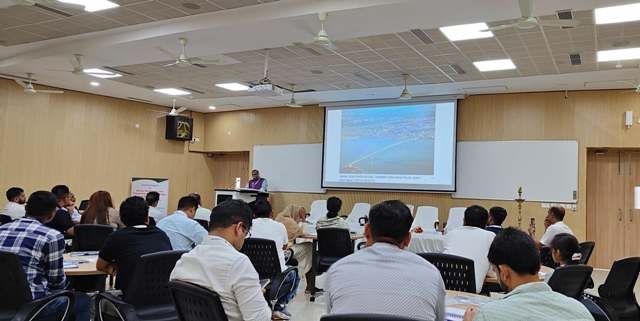Bhubaneswar: Indian Institute of Technology (IIT) Bhubaneswar is organising a 5-day training programme on ‘Survey, Investigation
and Preparation of DPR for Bridges in Rural Roads’ from 9th to 13th September 2024, highlighting the Importance of Data-centric thorough research, Geotechnical Investigation and Safe & Resilient Design in bridge construction.
The training programme is being organised by the School of Infrastructure of the Institute. The event was inaugurated by Er. Ashok Kumar Basa, a renowned bridge engineer from Odisha, former President, of the Institute of Engineers India (IEI), and currently serving as the Executive Vice President of the World Federation of Engineering Organizations (WFEO).
The inauguration ceremony was also attended by Shri Aswani Kumar Padhi, Senior Bridge Engineer from SMEC India; Prof. V. Panduranga, Dean of Continuing Education at IIT Bhubaneswar; and Prof. Sumanta Haldar, Head of the School of Infrastructure. The course was coordinated by Dr Suresh R. Dash and Dr Umesh Chandra Sahoo of the School of Infrastructure, IIT Bhubaneswar. More than 40 delegates from across India, involved in bridge analysis, design, or construction, participated in the workshop.
The course received financial support from NRIDA, Government of India. It may be mentioned that Since 2012, IIT Bhubaneswar has been providing technical services to the PMGSY (Pradhan Mantri Gram Sadak Yojana) programme as the State Technical Agency (STA) and Principal Technical Agency (PTA) for Odisha, Jharkhand, and Chhattisgarh. During reviews of Detailed Project Reports (DPRs), numerous deficiencies are often identified, highlighting significant potential for improvement. In this context, the training program aims to offer an interactive platform for delegates to explore the fundamentals of bridge engineering.
Speaking on this occasion, Dr Dash emphasized that, despite the critical role of bridges in our infrastructure, bridge design is frequently overlooked in regular academic curricula in India. Past bridge failures have highlighted the need for serious attention to bridge design, construction, and maintenance. The frequent news of bridge failures is concerning. Although bridges are designed to last 100 years, their premature deterioration raises concerns for all involved in their planning, design, construction, and maintenance.
Motivating delegates on the importance of studying bridge failures constructively to prevent future mistakes, Shri Basa highlighted the profession’s pride in constructing numerous monumental bridges. He stressed the importance of thorough and accurate geotechnical and hydrological site data collection, likening it to prescribing medicine based on accurate pathological reports. Without adequate site data, no amount of sophistication in design can prevent structural failure.
He also discussed several bridge failure cases, illustrating how minor mistakes in design or construction can lead to catastrophic consequences. This 5-day training programme will cover several crucial aspects of bridge design, including Bridge Planning, DPR Preparation for Bridges, Soil Investigation, Hydraulic
Design, Load Assessment on Bridges, and the Design of Superstructures, Substructures, and Foundations, including Seismic Considerations. Advanced topics such as Lightweight Bridges and Bridge Health Monitoring will also be discussed. The course will feature hands-on exercises and a field visit to an under-construction bridge site.




